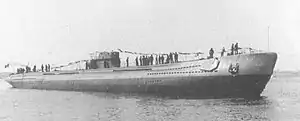Italian R-class submarine
The R-class or Romolo-class submarine was a group of submarines built for the Royal Italian Navy (Regia Marina Italiana) during World War II. They were designed as blockade running transport submarines for transporting high-value cargo from Europe to Japan and vice versa. Axis-occupied Europe lacked strategic materials such as tungsten, tin and some commodities such as rubber.
 Romolo-class submarine (Romolo) | |
| Class overview | |
|---|---|
| Name | Romolo |
| Builders | Tosi, CRDA |
| Operators | |
| Built | 1942–1943 |
| In service | 1943 |
| Planned | 12 |
| Completed | 2 |
| Cancelled | 10 |
| Lost | 2 |
| General characteristics | |
| Type | Transport submarines |
| Displacement | |
| Length | 86.5 m (283 ft 10 in) |
| Beam | 7.86 m (25 ft 9 in) |
| Draft | 5.34 m (17 ft 6 in) |
| Installed power | |
| Propulsion | |
| Speed |
|
| Range |
|
| Test depth | 80 m (260 ft) |
| Capacity | 600 t (591 long tons) of cargo |
| Complement | 63 |
| Armament |
|
Design and description
The R-class submarines displaced 2,155 metric tons (2,121 long tons) surfaced and 2,560 metric tons (2,520 long tons) submerged. The submarines were 86.5 meters (283 ft 10 in) long, had a beam of 7.86 meters (25 ft 9 in) and a draft of 5.34 meters (17 ft 6 in). They had a cargo capacity of 600 tonnes (591 long tons). [1]
For surface running, the boats were powered by two 1,300-brake-horsepower (969 kW) diesel engines, each driving one propeller shaft. When submerged each propeller was driven by a 450-horsepower (336 kW) electric motor. They could reach 13 knots (24 km/h; 15 mph) on the surface and 6 knots (11 km/h; 6.9 mph) underwater. On the surface, the R class had a range of 12,000 nautical miles (22,000 km; 14,000 mi) at 9 knots (17 km/h; 10 mph); submerged, they had a range of 110 nmi (200 km; 130 mi) at 3.5 knots (6.5 km/h; 4.0 mph).[2]
The boats were only armed for self-defense with three 20-millimeter (0.79 in) light anti-aircraft guns. Some boats may have been equipped with a pair of internal 45 cm (17.7 in) torpedo tubes in the bow and stern.[1]
Boats
Twelve boats were ordered, but only two were completed, by Tosi:
- Remo, named after Remus, launched 28 March 1943 – Sunk by the British submarine HMS United 15 July 1943 in the Gulf of Taranto
- Romolo, named after Romulus, launched 21 March 1943 – Sunk by Allied aircraft near Augusta 18 July 1943.
The remaining 10 hulls were scuttled incomplete and scrapped after the war.
The sail of submarine R12 is now exhibited as a monument on the seafront of Gaeta.
See also
- Merchant submarine
- German submarine Deutschland, an unarmed transport submarine built by Germany in World War I.
Notes
- Chesneau, p. 307
- Bagnasco, p. 166
Bibliography
- Bagnasco, Erminio (1977). Submarines of World War Two. Annapolis, Maryland: Naval Institute Press. ISBN 0-87021-962-6.
- Chesneau, Roger, ed. (1980). Conway's All the World's Fighting Ships 1922–1946. Greenwich, UK: Conway Maritime Press. ISBN 0-85177-146-7.
- Rohwer, Jürgen (2005). Chronology of the War at Sea 1939–1945: The Naval History of World War Two (Third Revised ed.). Annapolis, Maryland: Naval Institute Press. ISBN 1-59114-119-2.
- Frampton, Viktor (2005). "Question 9/98: Italian North African Convoys of WW II". Warship International. XLII (4): 424–425. ISSN 0043-0374.
External links
- Sommergibili Marina Militare website